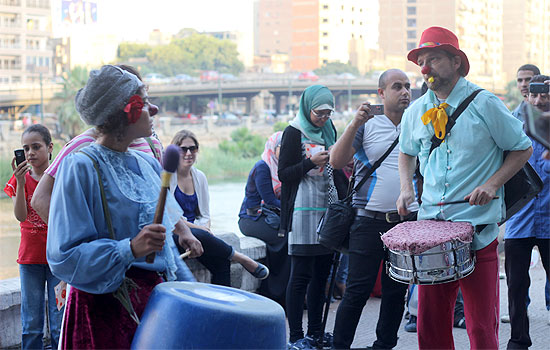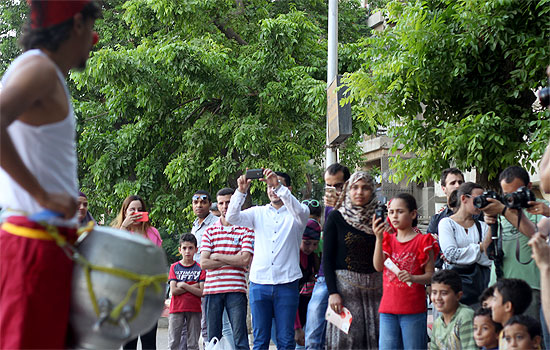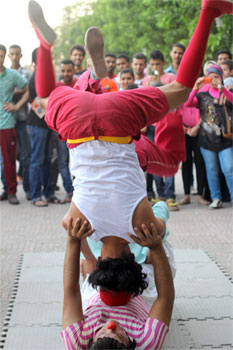It was 16 June, a hot Tuesday afternoon... Khalid stood with his seven-year-old son Ahmed outside the tattered café he works at in Manial, Cairo. He had just finished his shift and was busy shuffling a worn plastic bag filled with food for his family from arm to arm. Bringing Ahmed to work was his only chance to add colour to the young boy's otherwise humdrum summer.
In that moment, though, he had a little help amplifying that colour when the street performing group Outa Hamra sailed by the café and Ahmed grabbed his dad’s arm to chase them down, running so quickly that Khalid was forced to drop the bag to keep up with his son.
Outa Hamra, working with Mahatat for Contemporary Art, is a five-person clown show that works to bring art to places that are deprived of access to cultural activities.
Throughout the Mahatat's Art of Transit tour, which took place from 12-16 June and spanned Port Said, Damietta, Mansoura and Cairo, the Outa Hamra troupe used music, acting, acrobatics and humour to both entertain and infuse culture into the surrounding community, differing from other types of art because of their accessibility. Art of Transit attracts the viewers, entertains, and provides much needed art. It doesn’t have a designated dress code, doesn’t hide behind the walls of an institution, doesn’t demand anything of its audience. This is street art in its full sense!
This approach to the craft caters to everyone and allows them to shed their often self-imposed barriers regarding attending cultural events, as it is free from the variety of boundaries that some institutions possess.
“We love art, but we don’t have the ability to go anywhere else, so this is all we can see,” Khalid tells Ahram Online. “I don’t think I’ve ever seen my son so happy.”

Outa Hamra performs in Manial, Cairo (Photo: Mohamed El-Betity)
In Manial, people from all ages and socioeconomic classes paused the pattern of their everyday routines to watch the show. The clowns garnered awe and wonder from the audience, but most importantly, bridged the gap between them and art.
“If this was in a theatre or somewhere closed, people probably wouldn’t go to it because of the money. The world has become a sad place; happiness doesn’t come through art the way it used to,” Amina Soliman, a student at the Cairo University, told Ahram Online.
“Shows like this make people happy all the time whether or not they have money.”
Many other audience members echoed Soliman’s sentiment, emphasising that what lured them to this show was the vivacity the clowns harboured, the way they tore through the fabric of triviality and interacted with audience members in a humorous fashion.
“The people are depressed and they’re waiting for something to make them happy, to make them laugh. As soon as they turn on the TV they don’t see anything except ‘who died,’ ‘who got kidnapped’ etc,” Ahmed Sayed, who was working on a commercial nearby when he heard the show, said.
“But look at the people gathered right now – everyone’s smiling, everyone’s happy.” He trailed off and smiled too as the drums began again and the children started to clap.
Another important element about this show is that it doesn’t operate on a strict timeline and force people to construct their schedule around it; it just happens.
Marwa Fawzy, who was out running errands when she heard the drums, sprinted to her nearby apartment to take her two kids to watch it, saying that they never have any time to go see anything related to art, but this show doesn’t force them to travel too far.
One bystander, Anas Sherif, a chef at a fish restaurant in the area, commented on the substantial gap between the classes in Cairo, and how Outa Hamra, despite their ability to reach a wide range of people in one area, would not fare well in a poorer and more neglected community.

Outa Hamra performs in Manial, Cairo (Photo: Mohamed El-Betity)
Sherif who lives in one of those communities but works in Manial, points to the show and says, “the little kids aren’t well raised in those places so they won't accept something like this. They might throw rocks or sabotage their act while they’re walking. If we were to show these types of arts in other places, like in schools, they’ll see that it’s normal and not something to laugh at.”
In fact, the challenging attitudes from children are not strange to the art's players. Al-Darb Al-Ahmar Arts School is a great example of how art transforms the community.
When Al-Mawred Al-Thaqafi launched El-Geneina theatre's activities in 2005, at first the organisers did not pay much attention to the underprivileged neighbourhood surrounding the theatre.
An article published in 2014 quotes Basma El-Husseiny, founder and director of Al-Mawred Al-Thaqafi, saying that "the youth and children were climbing on the fence, shouting from the building rooftops, cursing and throwing things at us. So we tried to engage them through workshops of painting, mask making, puppetry." This is how – and partly 'why' – Al-Darb Al-Ahmar Arts School was launched, teaching children circus and theatre arts, creating performances, and building a creative relationship with the neighborhood.
Many children still lack exposure to the arts. Initiatives such as the one of Mahatat for Contemporary Art – in this Art of Transit joined by Outa Hamra – works to restructure the template of the community, hoping that with every joke and cartwheel made, they can reach those people who have turned away from or not been exposed to art, making it more than a method of entertainment, but a snapshot into a world that sings with so much more colour, culture, character and life.
“See all the kids coming here, if they weren’t watching this right now they would be throwing rocks on the street trying to find a way to play, and instead they’re sitting here having fun,” Hossam Ali, an engineer, said.
“The best thing is that these performers are acting out real life but in a simple show … it’s simple, but it entertains the people in front of them and brings them happiness.”
Ahram Online is official media partner of Mahatat in Art of Transit.

Outa Hamra performs in Manial, Cairo (Photo: Mohamed El-Betity)
Short link: